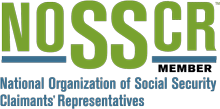PROACTIVE DISABILITY PROCESS
To be successful in a Social Security disability claim the claimant must be proactive. It isn't enough just to file the proper forms and wait on the process. It is very much a hands-on process - at least for the successful claimants. What should you be doing?
INITIAL PROCESS: You've filed all the papers, including all the forms that the Disability Determination Service sent you in the mail. Call your doctors and other medical providers to let them know you have filed a claim. Ask them to submit medical records and other information requested by DDS promptly. Call your disability specialist at DDS about every 10 to 14 days to ask for a status report. Find out if one or more doctors has not submitted medical records. Follow up again with that doctor.
APPEAL PROCESS: If your claim is denied at the initial level, ask for an appeal within 60 days (in writing). Your case will now shift back to Social Security from DDS. A special unit called the Office of Disability Adjudication and Review (ODAR) will process your appeal. It is up to you--the claimant or your representative-- to submit all of the evidence you want ODAR to consider. Ask your main doctor to give you a Medical Source Statement which outlines the severity of your condition and quantifies your functional limitations into categories (moderate, marked, severe, or extreme). Social Security has a form (HA-1151) that you can use for that purpose. For a mental impairment, use form SSA-1152).
If you have a representative, he or she will know exactly what forms to submit and what evidence to obtain for your appeal. The chances of winning, both at the initial and appeal level, is greatly increased when the claimant takes a proactive approach.
For more information on Social Security disability advocates or representatives, and how a representative may improve your odds of winning, connect to the main web page for the Forsythe Firm here.
INITIAL PROCESS: You've filed all the papers, including all the forms that the Disability Determination Service sent you in the mail. Call your doctors and other medical providers to let them know you have filed a claim. Ask them to submit medical records and other information requested by DDS promptly. Call your disability specialist at DDS about every 10 to 14 days to ask for a status report. Find out if one or more doctors has not submitted medical records. Follow up again with that doctor.
APPEAL PROCESS: If your claim is denied at the initial level, ask for an appeal within 60 days (in writing). Your case will now shift back to Social Security from DDS. A special unit called the Office of Disability Adjudication and Review (ODAR) will process your appeal. It is up to you--the claimant or your representative-- to submit all of the evidence you want ODAR to consider. Ask your main doctor to give you a Medical Source Statement which outlines the severity of your condition and quantifies your functional limitations into categories (moderate, marked, severe, or extreme). Social Security has a form (HA-1151) that you can use for that purpose. For a mental impairment, use form SSA-1152).
If you have a representative, he or she will know exactly what forms to submit and what evidence to obtain for your appeal. The chances of winning, both at the initial and appeal level, is greatly increased when the claimant takes a proactive approach.
For more information on Social Security disability advocates or representatives, and how a representative may improve your odds of winning, connect to the main web page for the Forsythe Firm here.

Comments
Post a Comment